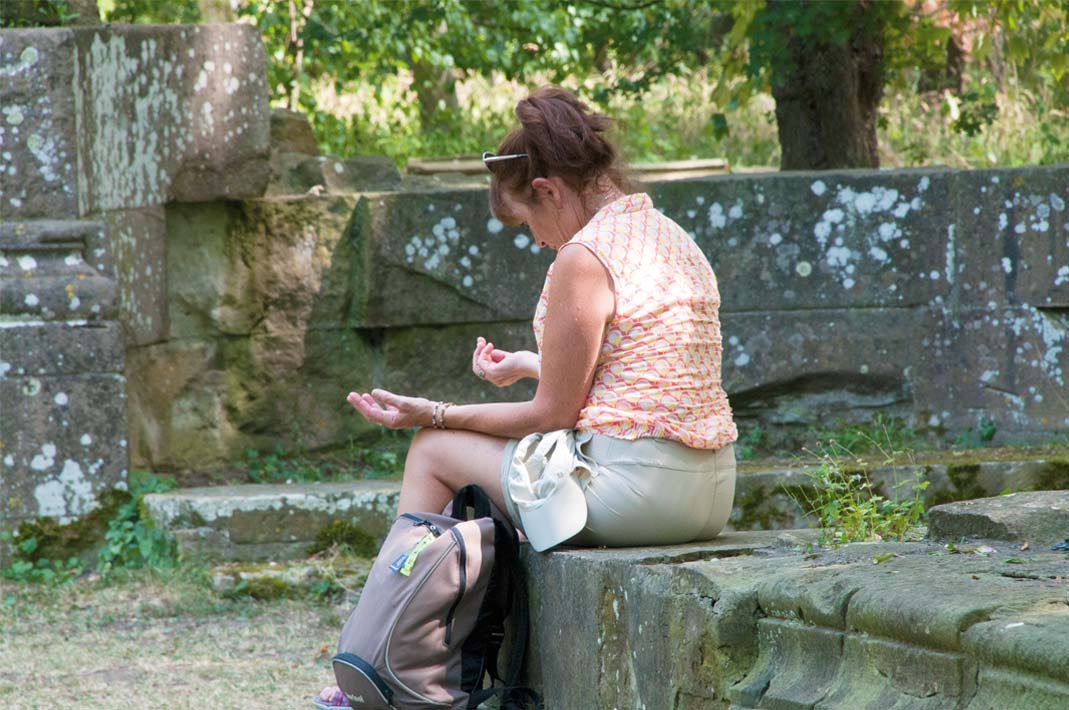Guiding theme: Valueful pilgrimage
Impulses for being on the Way on the Starry Path in the Heart of Europe
The time is ripe to set out on new paths. A better world is possible and this is paving its way in the spiritual attitude of each individual. The large regional network of paths of the European model project “Starry Path/

For which values am I on the road?
As part of the European model project “Starry Path/

“Spiritual baggage” - impulse generator for a compass of values
The following explanations of a selection of socially relevant values are of great importance in the current public discourse in European society for an ethically sustainable worldview of a modern and humanistic Europe. They reflect, as it were, in summary, the social, intellectual and cultural foundation of Europe and are to be understood - without claiming to be complete in terms of content and completeness - as a source of impetus and orientation for thinking in and out. As “spiritual luggage”, these values can be used creatively on a pilgrimage or during a pause (see below). Recommendation for the pilgrimage on the Sternenweg) and contribute to a new self-understanding of social cohesion and jointly lived European basic values. Already in the mental argument with these topics and the most different levels, on which they become relevant, you take influence on the collective process of a value formation and their binding force within our European society and you take over beyond that responsibility for yourselves and others! A common thinking, shaping and above all living of these values creates a sense of life, promotes political participation and provides an active contribution to the civic competence within our free, European society. Symbolically, this canon of values is represented in a mission statement, which should motivate pilgrims along the stars.
So bring yourself along the stars of Europe in a physical as well as in a spiritual forward movement and enjoy the ways and detours to bring new thinking and acting into the world with your impulses and own ideas.
Values level
Selection of basic social values as a framework condition of a humane and humanitarian coexistence and as a perspective of a self-determined, creative life within the community of mankind.
Peace
Lao Tzu, Chinese philosopher, 4th-3rd century B.C.

Question: How much importance do I give to inner peace in my life?
Impulse: Every step towards your own inner peace has an expanding effect on the peace outside. Every peaceful attitude and action gives you inner strength and confidence and is a contribution to all-connectedness and peace in the world.
What idea of my own do I have for today’s path?
Humanity
The purpose of our existence is directed to the formation of humanity. Our rational activity should be formed to reason, our finer senses to art, our instincts to genuine freedom and beauty, our motive forces to human love.
Johann Gottfried von Herder (1744-1803)
Humanity (lat. humanitas) as a term stands for humanity, fellow humanity and the continuous cultural formation of the mind, which aims at the realization of human rights, helpfulness and participation. It is about the position of man in the world and for the world: to be responsible, to follow the truth on the trail and to fathom the innermost part of what constitutes being human. What is meant is to understand the very mission of being human - the conditio humana - and to live accordingly. With this grounding of humanity, humanity belongs to the very destiny of man in all his spheres of life. It is defined and brought to life both by the individual and by the particular culture concerned, which practices it. The humanitarian worldview in most cultures includes the values of dignity, connectedness, compassion, kindness, charity, helpfulness and mercy. The elementary prerequisites of a humane way of life include openness and kindness. The ability to recognize the polarities that arise on each individual life path and to balance them in the interplay between the inner and outer worlds, if possible to reconcile them, is one of the essential characteristics of humanity.

Question: When and in what areas of life am I compassionate?
Impulse: On my journey through life, I want to be human in my very own way. In this attitude I would like to work especially in small things.
What idea of my own do I have for today’s path?
Freedom
Peter Michael Lupp

Question: What freedoms do I actively enjoy? Am I aware of the privilege of living in freedom?
Impulse: Know yourself! With every step I come closer to myself, find myself, live from the center, become more truthful and free in thought and action.
What idea of my own do I have for today’s path?
Democracy
Democracy always means: the willingness to see not only one’s own interests and the ability to balance and compromise.
Frank-Walter Steinmeier
If we don’t take care of her, she’ll go….
Peer Steinbrück
Democracy (from the ancient Greek δημοκρατία’ rule of the people) today refers to forms of rule, political orders or political systems in which power and government emanate from the people. It forms the basis of our European society. At the same time, democracy is also the most vulnerable of all forms of government that regulate the common good, in which the people participate either directly (direct democracy) or through the selection of decision-making representatives (representative democracy) in all decisions that bindingly affect the general public. In democratic states and political systems, the government emerges from the people through political elections. Freedom of opinion and freedom of the press are essential to the formation of political will. Other important characteristics of a modern democracy are free and equal elections, the majority or consensus principle, protection of minorities, acceptance of a political opposition, separation of powers, constitutionality and protection of fundamental, civil and human rights.

Question: What is the meaning of civic belonging for me? What active contributions do I make to the common good of the society in which I live? Am I willing to actively stand up for the rule of law, the protection of human rights and equality when it becomes necessary?
Impulse: I open myself on my way for the recognition and appreciation of diversity in our society. I am committed to enabling all people to live peacefully in democratic structures.
What idea of my own do I have for today’s path?
Emotion level
Human social behavior, which is based in particular on social and moral emotions, is an essential factor in ensuring that ethical and moral values are not only understood and respected, but also internalized. Only in this way can they become relevant in everyday actions and promote and advance peace and the common good. Social and moral emotions reflect the emotional intelligence of human beings and are fostered in particular by the following aspects: Tolerance, friendship, compassion, solidarity and a willingness to meet other cultures open-mindedly based on this.
Tolerance
Without tolerance we cannot develop compassion.
Dalai Lama
Tolerance refers to “letting others’ views, beliefs, actions and customs be so” and is a central characteristic of democracy. Tolerance also stands as a description of equality, diversity and the avoidance of exclusion. Tolerance has great significance in social discourse. It is discussed, for example, in connection with religiosity, sexual inclinations, cultural differences and principled dissenters (value systems and value communities). The limits of tolerance do not soften as a result, but become clearer. They lie where others are denied this basic form of respect and equality. However, the responsibility for ensuring that these limits are respected cannot be completely ceded to the state. In the first place, it is the people themselves who are obliged to practice tolerance “rightly understood.” Tolerance, patience and attentiveness are closely related to tolerant behavior.

Question: Do I recognize and experience the diversity in living together within our society as enriching? Do I see myself as part of a cosmopolitan community?
Impulse: On my way, I open myself to perceive reality sensitively and mindfully. Along the way, I practice my tolerance and dialogue skills in respectful interaction with other points of view. Indifference towards my fellow human beings is alien to me.
What idea of my own do I have for today’s path?
Friendship
Unknown author
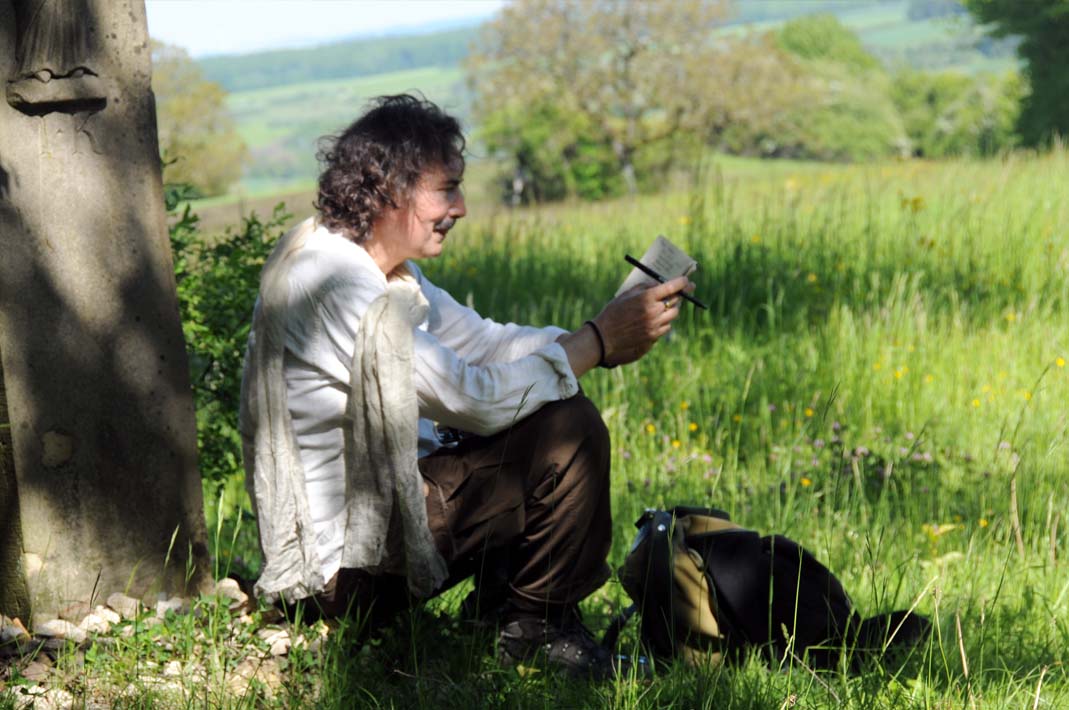
Question: What emotions guide me when I think about friendship?
Impulse: On my way, I dedicate time to thoughts of friends and give thanks in spirit for being able to share in their lives. In good days and in bad days they can count on me.
What idea of my own do I have for today’s path?
Compassion
Compassion for all creatures is what makes people truly human.
Albert Schweitzer
Compassion describes the sympathy for the situation of another individual and is a natural human ability. One’s own feelings resonate with the feelings of another living being. This is a significant factor in the formation of emotional intelligence. In sympathizing with the feelings of others, people learn to better deal with their own emotions. A variation of compassion is empathy, which helps people empathize with the thoughts of the other person, understand them, respond to them, and react accordingly. Our mirror neurons in the brain can mirror other people’s feelings to us. Compassion for other human and non-human beings requires acceptance of one’s self and love for oneself.

Question: What do I think and feel about myself? With what feelings towards others am I on the road?
Impulse: I also observe my emotional world for myself and others on my way. Every person I meet and people I am thinking about, I wish them well and bless them silently.
What idea of my own do I have for today’s path?
Solidarity
Peter Michael Lupp
Solidarity (Latin: solidus) is derived from the word meaning “solid, genuine, firm” and is thus associated with permanence, continuity and stability. An attitude of solidarity, usually named in an ethical-political context, which actively supports the ideas, activities and goals of others, is described as solidarity. Solidarity requires a public space and proximity in order to express sympathy, attachment and compassion towards others. It is also about growing together in a cosmopolitan community in an attitude of friendship to peacefully stand up for common values. The opposite concept to solidarity is competition.
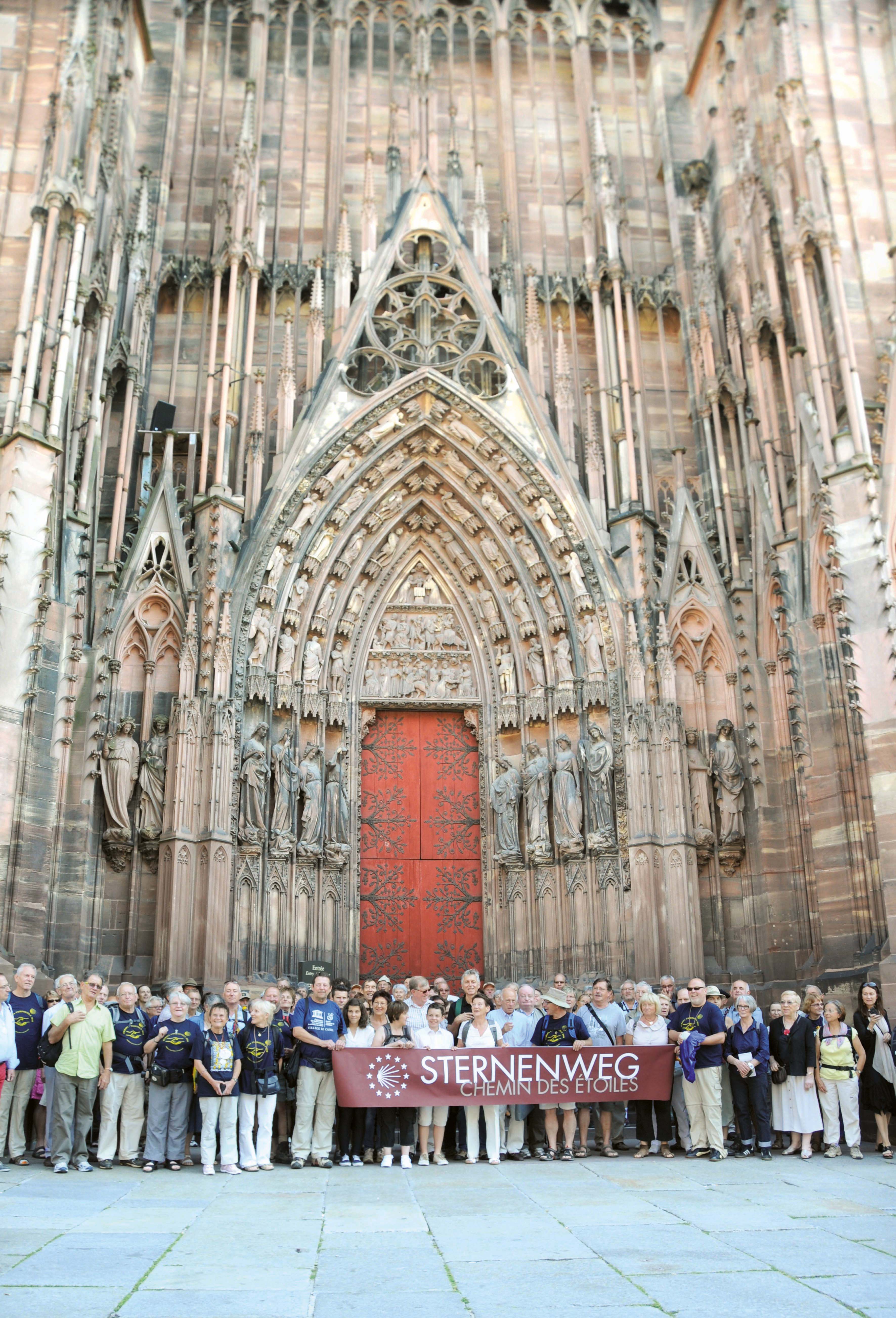
Question: With which cosmopolitan European values am I in harmony and do I feel connected to others through them?
Impulse: My encounters on the road remind me of responsible action for the community of people, especially in times of crisis. I plant this thought in my innermost being and it gives me relationship with other people, self-confidence and strength. As far as I am able, I would like to assist people around me in distress, illness and despair.
What idea of my own do I have for today’s path?
Encounter of cultures
Peter Michael Lupp

Question: Am I open to encounters on the road? With what appreciation and respect do I meet people from other cultures on my way?
Impulse: Diversity and a dignified way of dealing with different cultures and their ways of life endows with new seeing and understanding and is an enrichment of society and everyday life: living together, openly, in diversity as a matter of course.
What idea of my own do I have for today’s path?
Ecology level
Preserve creation
Peter Michael Lupp
Due to unreflective growth thinking, the power of the markets and our consumer behavior, man’s natural sense for the “Blue Planet Earth” - creation - is creeping out of kilter. Mankind currently consumes about 50 percent more resources each year than the earth can regenerate and thus provide sustainably within this period. As a result, the earth, but also humanity itself, is increasingly losing its ecological and ethical balance, which is essential for survival.
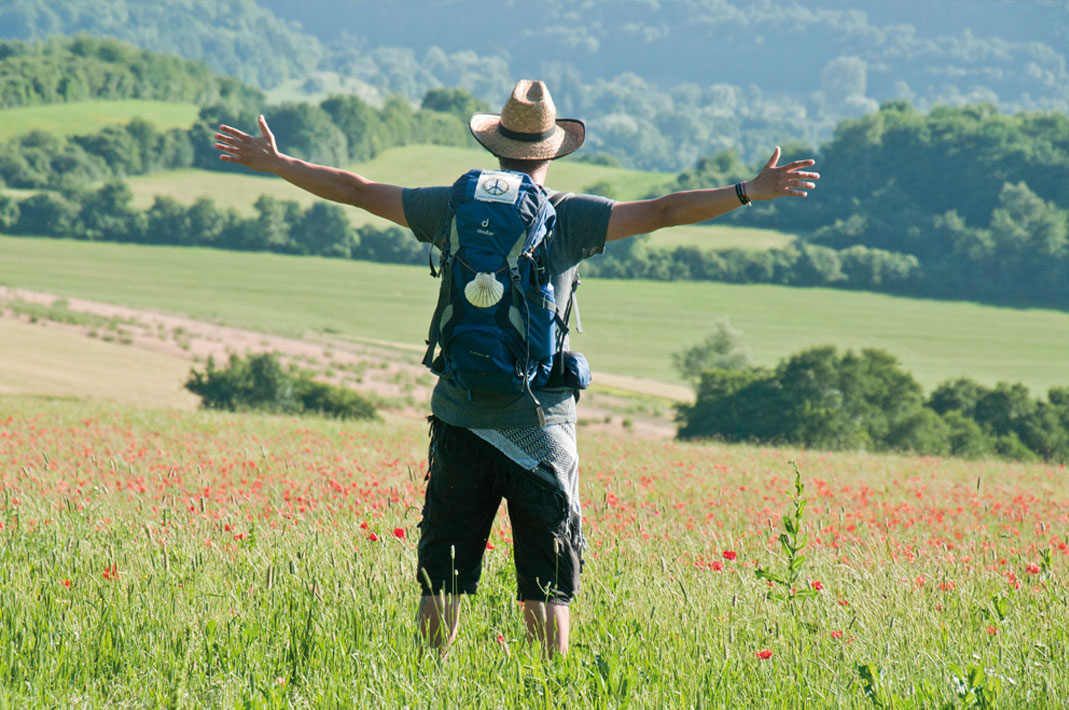
How can we cultivate a way of life of “less” with joy, meaning and spirit, build a society that consumes less, that recognizes and avoids spirals of risk? Every human being has room for maneuver - that is our privilege!
Question: Do I see the beauty of nature and the wonders of this creation and what value do I give it today and in the future?
Impulse: It is my concern to sustainably secure the basis of life on this unique planet Earth. My responsibility is reflected in the daily handling of the gifts of nature, which should also be available to future generations. In this attitude I choose the path of the good life in the all-connectedness of creation earth.
What idea of my own do I have for today’s path?
Spirituality level
Spirituality
Johann Wolfgang von Goethe
Spirituality is about the “art of the way” of self-development, which goes hand in hand with a search for the actual meaning of life. In this process, the wonders of life and the meaning of one’s own life mission become more conscious and can be experienced in their actual (carrying) breadth, apart from purely rational ways of looking at things.
The spiritual dimension is, so to speak, the essence of the search movement for the source of life in the present. It ignites in conscious pausing and in full devotion. As soon as man seriously follows the spiritual path of connection with nature and the spiritual, he becomes more sensitive and permeable to a truly free life. The soul begins to breathe a sigh of relief and to mobilize the powers of transformation, the gaze is directed to the essential, paths open up.
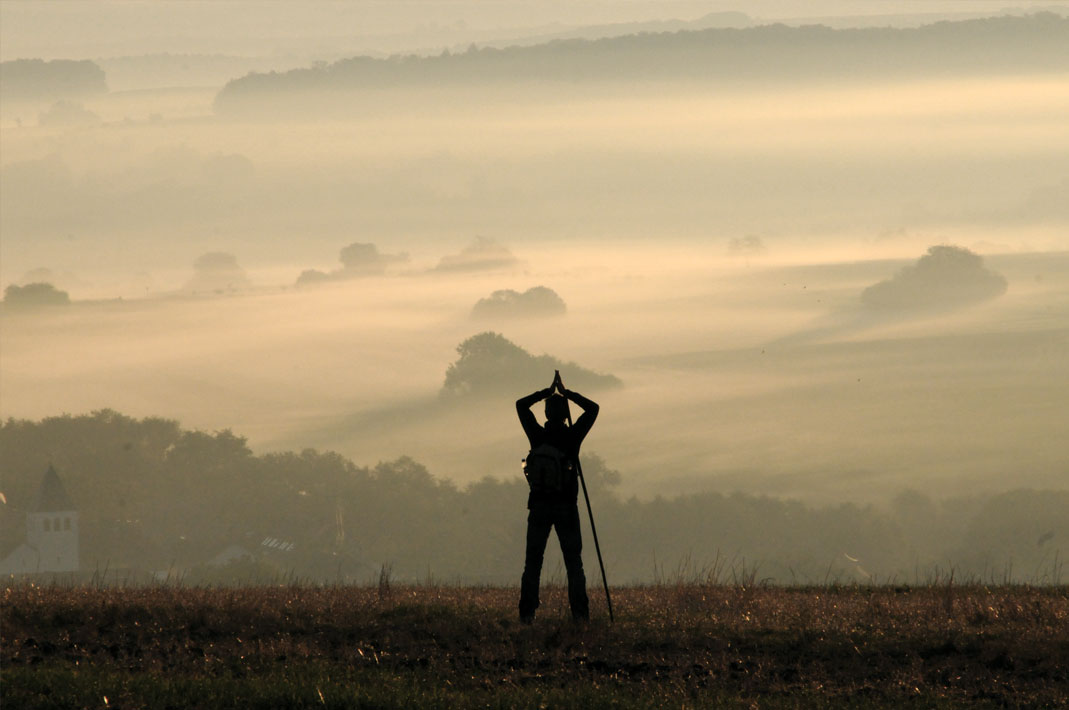
An access to experience spiritual reality can be opened especially through the practice of slowing down, mindfulness, undivided devotion, meditation or inner prayer (in an interdenominational context). This requires places where these practices can be celebrated undisturbed and time in which something can mature and heal. Meditative pilgrimages on the “Starry Path” and pausing at “holy places” of the past offer a variety of individual spaces of experience.
On a higher level, the inclusion of the spiritual dimension opens up to humanity the opportunity to make the meaning of human existence and its ethical and moral task more comprehensible and to act accordingly. In this lies a spiritual resource to cope with the upcoming change within our society in favor of a better world.
Question: What place do I give to the conscious experience of spirituality in my life? Do I use the possibilities of meditation to find inner peace and balance?
Impulse: On my path I consciously take time for an expression of spirituality that is in harmony with my inner being and practice it with full devotion (ritual, prayer, chanting, meditations, contemplation of images…).
What idea of my own do I have for today’s path?
Discover what connects
Recommendations for the value pilgrimage on the starry way
- Plan alone or with friends a pilgrimage walk on the “Starry Path/
Chemin des étoiles” - Pick out two or more medieval cultural monuments along a route of the project space in the interactive map or picture book.
- Choose a starting point and plan your individual pilgrimage tour from there to the selected destinations, even if it runs off the official marked paths. Hiking trails or bike paths off the marked routes of the paths of the pilgrims of St. James can be asked at the responsible tourist information, plan with the help of the many navigation options on the Internet (etc.) or simply ask for directions on the way.
- Take (in addition to sufficient provisions) a (value) theme with you on your way. The focus could be on the question: What values do I stand for in the present, what is my attitude today as a pilgrim along the stars?
- Pause along the way at special places in nature and at the selected medieval destinations. Try to experience or feel what impulse nature, the cultural heritage of the Middle Ages holds for you. Become aware of the fact that you are embarking on a path of knowledge, which often also gifts you with small gestures along the way. If possible, meditate in quiet places in nature that you intuitively choose for yourself, or in the (medieval) churches along the way. Concentrate on your breath during meditation and let arising thoughts move on like clouds (for a suggestion of a meditation for pilgrimage walking see appendix).
- Along the way, consciously pay attention to details in the landscape or when meeting others. Many people have been here before you and many will follow you. Everything is interrelated. Take the opportunity for an inner dialogue or exchange with those who accompany you. A rest stop offers the opportunity to read a suitable text (literature, poem), to pray, to sing or even to write and paint.
- Preserve your encounters and experiences along the way with notes, drawings.
- Along the way, collect pilgrimage stamps, if you have them, in the attached stamp boxes and connect it to one of the impulses listed there.
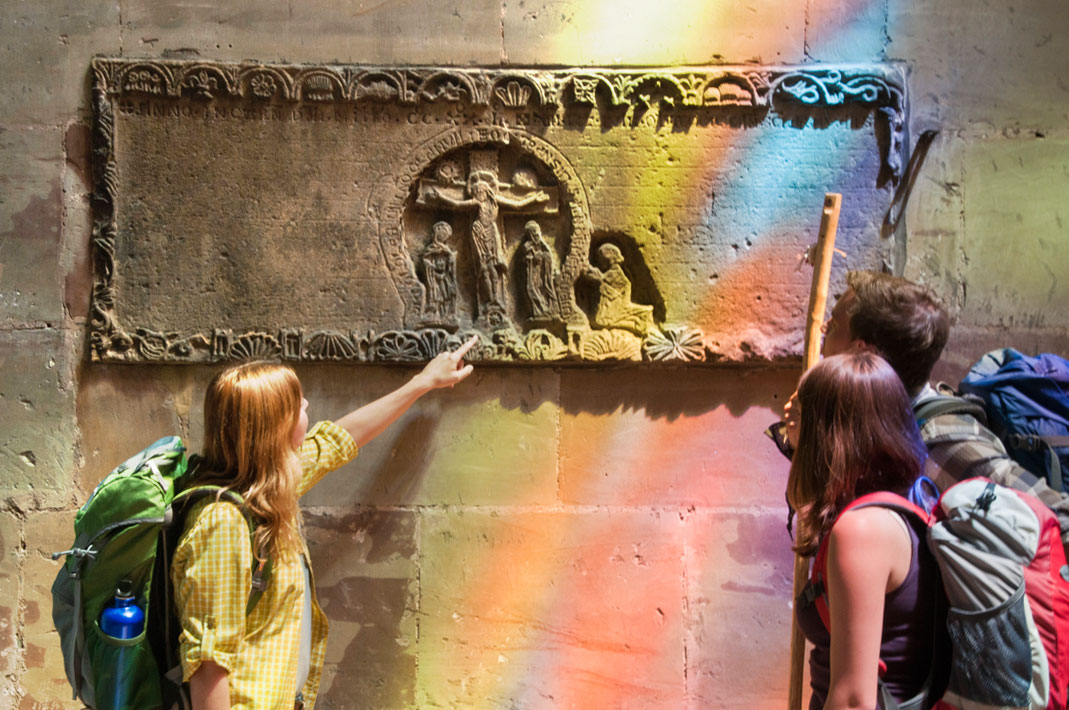
Meditation
The breath flows slowly and deeply in and out through the nose.
Inhaling and exhaling stabilizes your inner balance.
The deep inhalation and exhalation centers your self.
Let yourself be carried deep inside to the bottom of your soul with full devotion.
Thoughts drift away like clouds and gradually dissolve as if warmed by the sun.
The source of creation arises from the emptiness of thought. What is essential emerges tangibly. The path of the good life opens.
After the meditation, stand up and let the moment resonate, breathe in and out through your nose again deeply and calmly.
Into the bottom of the soul.
Out to continue your way courageously.
